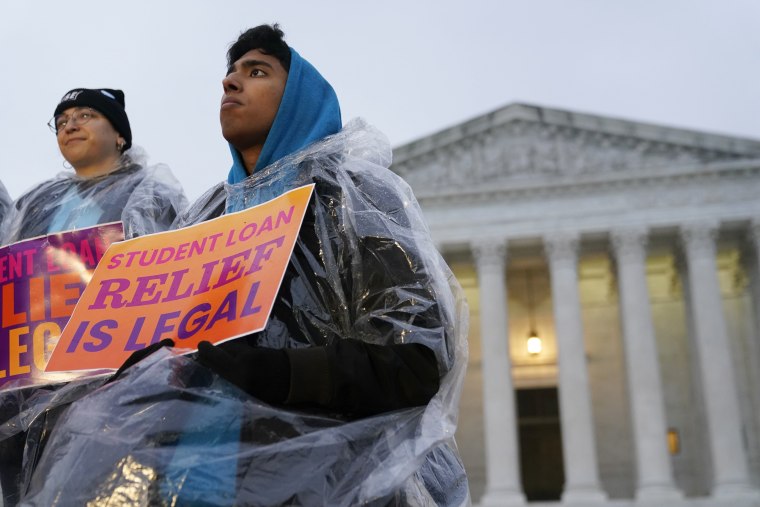[ad_1]
WASHINGTON — The Supreme Court on Tuesday will consider whether to strike down President Joe Biden’s student loan debt relief plan, the type of expansive use of presidential power about which the conservative majority has often expressed skepticism.
The program, which would allow eligible borrowers to cancel up to $20,000 in debt, has been blocked since the 8th U.S. Circuit Court of Appeals issued a temporary hold in October, and there are major doubts it will ever go into effect.
The court is hearing two cases, one brought by six states, including Missouri, and the other brought by two people, Myra Brown and Alexander Taylor, who hold student loan debt.
Supporters of Biden’s plan rallied outside the court ahead of the oral arguments. A sign held by one protester said “student loan debt cancellation is not illegal!” Another sign said “40 million families need student loan relief now.”
Speaking to the crowd, Sen. Bob Menendez, D-N.J., exhorted the court to “do the right thing.”
The challengers argue that the administration’s proposal — announced by Biden in August and originally scheduled to take effect last fall — violates the Constitution and federal law, partly because it circumvents Congress, which they said has the sole power to create laws related to student loan forgiveness.

A key threshold question in the case is whether any of the challengers have legal standing to sue in the first place. Many observers think that if the court, which has a 6-3 conservative majority, finds that the challengers had standing to sue, it will almost certainly then conclude that Biden’s plan is unlawful.
Of the various challengers, Missouri may have the best argument for standing based on its association with the Missouri Higher Education Loan Authority, a state-created entity that services many student loans. The Supreme Court only has to find that one challenger has legal standing in order to reach the merits of the case.
The justices could decide the case based on a legal argument made by the challengers that the Supreme Court has recently embraced called the “major questions doctrine.” Under that theory, federal agencies cannot initiate sweeping new policies that have a significant economic impact without having express authorization from Congress. A ruling is expected by the end of June.
The conservative majority cited the major questions doctrine last year in blocking Biden’s Covid vaccination or test requirement for larger businesses and curbing the authority of the Environmental Protection Agency to limit carbon emissions from power plants.
The Biden administration says debt relief is permitted under a 2003 law called the Higher Education Relief Opportunities for Students Act, or HEROES Act. The law states that the government can provide relief to recipients of student loans when there is a “national emergency,” allowing the government to take action to ensure people are not in “a worse position financially” as a result of the emergency.
The challengers say the language in the HEROES Act is not specific enough to authorize a proposal as broad as Biden’s plan.
Both Biden and his predecessor, Donald Trump, cited the HEROES Act in suspending loan payments during the pandemic. Although Biden plans to end the Covid emergency in May, this should not affect his loan plan, his administration says, because it addresses economic harms that took place during the pandemic.
Biden’s program would cancel up to $10,000 in debt for borrowers earning less than $125,000 a year (or couples who file taxes jointly and earn less than $250,000 annually). Pell Grant recipients, who are the majority of borrowers, would be eligible for an additional $10,000 in debt relief. The overall program could help more than 40 million borrowers, the administration has said.
The administration closed the application process after the plan was blocked. Holders of student loan debt currently do not have to make payments as part of Covid relief measures that will remain in effect until after the Supreme Court issues its ruling.
The nonpartisan Congressional Budget Office estimated in September that Biden’s plan would cost $400 billion.
[ad_2]
Source link
